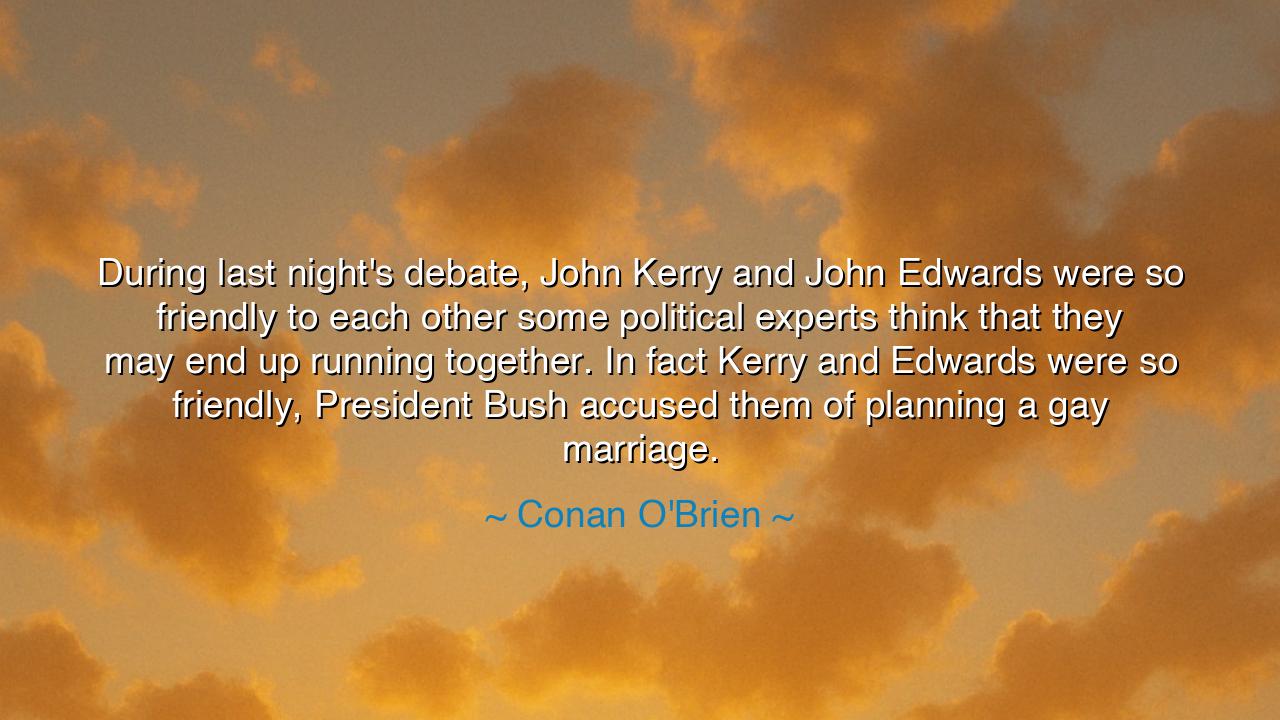
During last night's debate, John Kerry and John Edwards were so
During last night's debate, John Kerry and John Edwards were so friendly to each other some political experts think that they may end up running together. In fact Kerry and Edwards were so friendly, President Bush accused them of planning a gay marriage.






In the words of Conan O’Brien, with his sharp wit and jesting tongue: “During last night’s debate, John Kerry and John Edwards were so friendly to each other some political experts think that they may end up running together. In fact Kerry and Edwards were so friendly, President Bush accused them of planning a gay marriage.” Though spoken in humor, these words reveal the ancient truth that politics is as much about performance and perception as it is about policy. Laughter, after all, has always been a mirror of power, cutting through pride and revealing what lies beneath.
The ancients themselves knew the power of satire. Aristophanes, the playwright of Athens, wielded comedy as a weapon, mocking generals, philosophers, and politicians alike. His words could reduce men of great stature to figures of ridicule, yet in doing so, he awakened the people to truths that solemn speeches concealed. In Conan’s jest about Kerry and Edwards, there lies a satire not only of their friendship but of the very nature of alliances in politics—how quickly camaraderie can be spun into suspicion, how easily warmth is turned into mockery.
The reference to gay marriage is not only a joke, but also a reflection of the cultural and political tensions of its time. In the early 2000s, the question of same-sex unions burned fiercely in the hearts of America. For O’Brien to weave it into the jest shows how comedy becomes commentary—how the laughter of the people often rises from the deepest divisions of society. Humor, then, is not idle; it is a torch that both entertains and exposes.
We see echoes of this dynamic in the story of Diogenes the Cynic, who walked the streets of Athens with a lamp, declaring he was searching for an honest man. Like O’Brien, Diogenes cloaked truth in absurdity, mocking the pretenses of the powerful. He knew that sometimes the heart of the people is awakened not by solemn proclamations, but by the sting of ridicule. So too in this quote, the laughter reveals an ancient wisdom: that the friendships of leaders are always scrutinized, and that even the smallest gestures may be twisted into symbols by those who watch.
Yet let us not dismiss the deeper meaning hidden in humor. When Conan describes Kerry and Edwards as friendly, he speaks to the value of unity in a world of division. The jest may mock them, but beneath it lies an acknowledgment: that strength often lies in cooperation, and that the bonds of alliance are the seeds of power. Even if exaggerated into absurdity, this truth is one the ancients themselves cherished—for in the unity of allies, empires were forged and republics preserved.
The lesson, then, is not only about laughter, but about vigilance. Let us learn that in every age, politics and comedy are entwined. Leaders must not fear satire, for it is the people’s way of holding power to account. Citizens must not dismiss laughter, for it carries wisdom in disguise. And we ourselves must not be too quick to mock friendship, for what may seem like jest can also reveal the possibility of partnership, cooperation, and shared purpose.
Practical steps follow from this. Listen closely to humor, for within jokes lie truths that may be unspoken in solemn discourse. Do not fear ridicule, but examine it, for it may show you where pride or pretense has taken root. Value friendship and unity, even when mocked, for these are the ties that sustain both private life and public order. And finally, keep laughter in your heart, for laughter is not the enemy of wisdom but its companion, teaching us humility in joy and clarity in jest.
Thus, Conan O’Brien’s words, though clothed in comedy, remind us of an eternal truth: that laughter, friendship, and unity are as much a part of the political stage as speeches and policies. Let us then honor humor not as frivolous, but as one of the ancient voices of wisdom—playful, piercing, and forever unafraid to reveal what lies hidden behind the masks of power.






AAdministratorAdministrator
Welcome, honored guests. Please leave a comment, we will respond soon